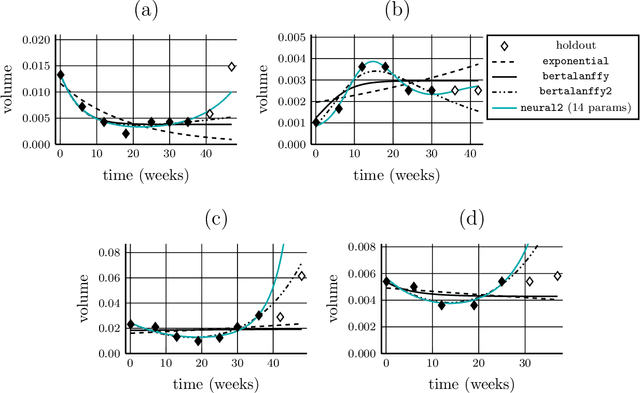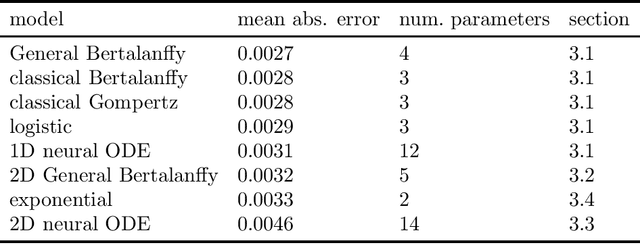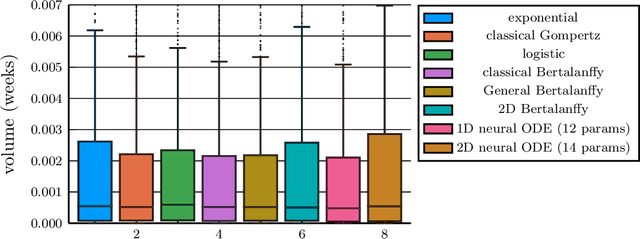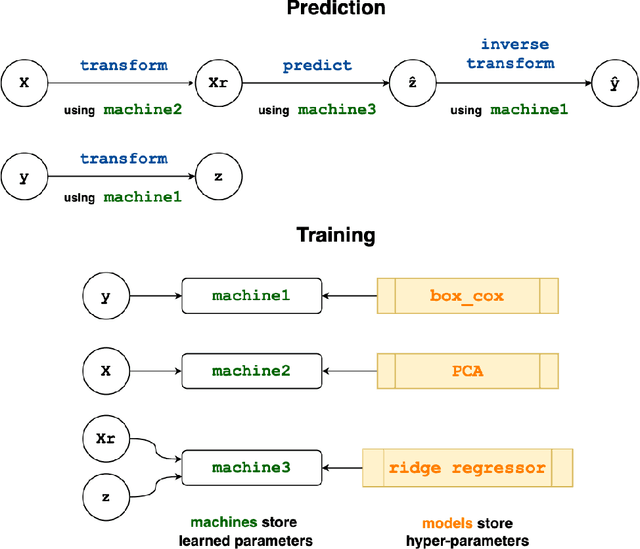Anthony D. Blaom
New tools for comparing classical and neural ODE models for tumor growth
Feb 11, 2025



Abstract:A new computational tool TumorGrowth.jl for modeling tumor growth is introduced. The tool allows the comparison of standard textbook models, such as General Bertalanffy and Gompertz, with some newer models, including, for the first time, neural ODE models. As an application, we revisit a human meta-study of non-small cell lung cancer and bladder cancer lesions, in patients undergoing two different treatment options, to determine if previously reported performance differences are statistically significant, and if newer, more complex models perform any better. In a population of examples with at least four time-volume measurements available for calibration, and an average of about 6.3, our main conclusion is that the General Bertalanffy model has superior performance, on average. However, where more measurements are available, we argue that more complex models, capable of capturing rebound and relapse behavior, may be better choices.
OutlierDetection.jl: A modular outlier detection ecosystem for the Julia programming language
Nov 08, 2022



Abstract:OutlierDetection.jl is an open-source ecosystem for outlier detection in Julia. It provides a range of high-performance outlier detection algorithms implemented directly in Julia. In contrast to previous packages, our ecosystem enables the development highly-scalable outlier detection algorithms using a high-level programming language. Additionally, it provides a standardized, yet flexible, interface for future outlier detection algorithms and allows for model composition unseen in previous packages. Best practices such as unit testing, continuous integration, and code coverage reporting are enforced across the ecosystem. The most recent version of OutlierDetection.jl is available at https://github.com/OutlierDetectionJL/OutlierDetection.jl.
Flexible model composition in machine learning and its implementation in MLJ
Dec 31, 2020


Abstract:A graph-based protocol called `learning networks' which combine assorted machine learning models into meta-models is described. Learning networks are shown to overcome several limitations of model composition as implemented in the dominant machine learning platforms. After illustrating the protocol in simple examples, a concise syntax for specifying a learning network, implemented in the MLJ framework, is presented. Using the syntax, it is shown that learning networks are are sufficiently flexible to include Wolpert's model stacking, with out-of-sample predictions for the base learners.
MLJ: A Julia package for composable Machine Learning
Jul 23, 2020

Abstract:MLJ (Machine Learing in Julia) is an open source software package providing a common interface for interacting with machine learning models written in Julia and other languages. It provides tools and meta-algorithms for selecting, tuning, evaluating, composing and comparing those models, with a focus on flexible model composition. In this design overview we detail chief novelties of the framework, together with the clear benefits of Julia over the dominant multi-language alternatives.
 Add to Chrome
Add to Chrome Add to Firefox
Add to Firefox Add to Edge
Add to Edge